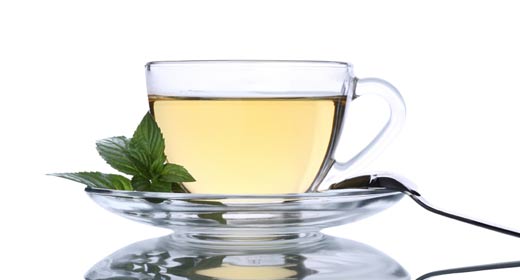
Basil (Ocimum basilicum) is an annual herb that originates from Italy, and in the 12th century, monks brought it to Central Europe. There is information that basil was found in the Egyptian pyramids 3500 years ago and was used in religious ceremonies. Today, this plant is used all over the world for culinary and medicinal purposes. Green basil is most often used, although there are also purple basil, which is used as an ornamental plant, and dark basil, which has a stronger flavor and is similar to ginger.
Basil is used in modern phytotherapy and in the pharmaceutical industry, but it is most often used in food as a spice and as a beneficial basil tea. Basil tea is made from the stems and leaves of the dried basil plant. It has a distinctive aroma and taste and is extremely healthy. You can read more about the medicinal properties of basil tea and the methods of its preparation below.

Medicinal properties
Basil is an extremely medicinal herb that helps treat many health problems. Basil leaves contain carbohydrates, vitamins A and C, minerals such as magnesium, manganese, potassium and iron, tannins, saponins and other useful ingredients.
Basil tea is a natural antioxidant and is good for treating infections and inflammatory processes in the body. Antioxidants found in basil successfully fight against free radicals, so this tea has the ability to prevent cell aging and various types of cancer. Thanks to its antibacterial and antiviral properties, this tea strengthens immunity and protects the body from flu, colds, bronchitis, asthma, inflamed sinuses and other ailments with the respiratory organs. This tea helps to clear the bronchi and expel mucus and is extremely good for treating coughs. Inhalation with basil tea is recommended for this purpose. All you need to do is place your face over a bowl of basil tea, cover your head with a towel and inhale deeply. For adults, it is necessary to inhale for a few minutes, and for children, 2-3 minutes of inhaling is enough. It is recommended to inhale this tea 2 times a day.
Then, this tea regulates the work of the intestines and improves digestion. In combination with other herbs, basil can help treat digestive problems. So, if you consume a tea mixture with basil, you will no longer have problems with stomach cramps, bloating and constipation. This tea is also recommended for women to alleviate menstrual problems. Basil tea is also recommended for diabetics because it can lower blood sugar levels. Thanks to the beta carotene found in basil, basil tea effectively treats asthma, rheumatoid arthritis and osteoarthritis. It is very effective in the fight against headaches and migraines, and it is also proven to lift the mood and improve concentration. It has been proven that this tea has a beneficial effect on the human psyche, so it is very effective for relieving stress and tension. Also, basil tea helps with insomnia and nocturnal urination. The magnesium found in basil strengthens the heart muscle and protects cardiovascular health. It has been proven that regular consumption of basil tea reduces the risk of heart attacks. If you use this tea as a poultice, it can help wounds heal faster. It is recommended that nursing mothers drink this tea because it promotes milk production.
Recipes for preparing this tea
There are different recipes for making basil tea. Various tea blends with basil can treat many health problems.
Recipe 1. Take one teaspoon of dried basil leaves and pour ¼ l of boiling water over it. Cover the tea and let it steep for about 10 minutes, then strain it. Basil tea should be drunk unsweetened and taken between meals. It is necessary to drink several cups of this tea during the day, for a period of 8 days. After that, you need to take a break of 2 weeks, and then you can continue using this tea. This tea is best for treating liver and gout.
Recipe 2. Take 30-50 g of dry basil leaves and pour over a liter of boiling water and let the tea steep for about 20 minutes, then strain it. Drink one cup of this tea after each meal. This tea is the most effective for getting rid of gas.
Side effects
Basil tea should not be consumed by pregnant women at the beginning of pregnancy or babies younger than six months, because this tea has a sedative effect. In addition, basil has a stimulating effect on the uterus and can cause premature cramps.